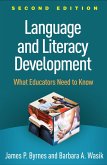Incorporating cognitive, neuropsychological, and sociocultural perspectives, this authoritative text explains the psychological processes involved in reading and describes applications for educational practice. The book follows a clear developmental sequence, from the impact of the early family environment through the acquisition of emergent literacy skills and the increasingly complex abilities required for word recognition, reading fluency, vocabulary growth, and text comprehension. Linguistic and cultural factors in individual reading differences are examined, as are psychological dimensions of reading motivation and the personal and societal benefits of reading.
Pedagogical Features
*End-of-chapter discussion questions and suggestions for further reading.
*Explicit linkages among theory, research, standards (including the Common Core State Standards), and instruction.
*Engaging case studies at the beginning of each chapter.
*Technology Toolbox explores the pros and cons of computer-assisted learning.
Pedagogical Features
*End-of-chapter discussion questions and suggestions for further reading.
*Explicit linkages among theory, research, standards (including the Common Core State Standards), and instruction.
*Engaging case studies at the beginning of each chapter.
*Technology Toolbox explores the pros and cons of computer-assisted learning.
Dieser Download kann aus rechtlichen Gründen nur mit Rechnungsadresse in A, D ausgeliefert werden.









